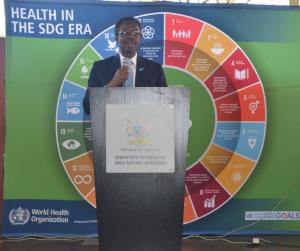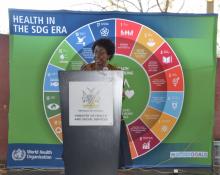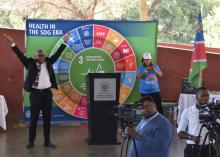Health for all Namibians
Namibia joined the rest of the world in commemorating the World Health Day under the theme ‘universal health coverage: everyone, everywhere’. The protracted Hepatitis E outbreak was the central theme in the speakers’ messages reiterating the urgency to provide water and sanitation services to the urban poor especially those living in informal settlements. The Minister of Health and Social Services, Honorable Dr Kalumbi Shangula, who officiated the event, called on all stakeholders to support the re-launched national campaign to combat Hepatitis E virus. He said that the outbreak is a serious public health threat and must be treated as such. He concluded his official address by stating that we have the responsibility to address inequity in health if we are to achieve vision 2030 and the sustainable development goals. ‘Universal health care shall be a reality in our time. The time to start is now’
The Governor of the Khomas Region, Honorable Laura Mcleod-Katjirua in her welcoming remarks reminded the audience of the high influx of people to the khomas region and the subsequent exponential growth in informal settlements which presents the capital city with myriad challenges. Access to quality, affordable and essential health care for all in the Khomas Region is a tall order given the socio-economic conditions of the city and realities of the urban poor. She said that the commemoration of the World Health Day necessitates ‘unwavering political commitment and choice’ to ensure universal health coverage and ‘meet the expectation of our people’. She applauded the Khomas Region ‘for the great sense of ownership in ensuring a healthy and hygienic working and living environment since the Hepatitis E outbreak. The Khomas Region won a trophy and certificate for the best coordinated and managed clean-up campaign in a recently launched Anti-littering campaign and the 2018 National clean-up award ceremony.
Dr Charles Sagoe-Moses, WHO Representative, said that since WHO’s establishment 71 years ago, the organization prioritized universal access to affordable, essential and quality health care services. This year’s commemoration aims to highlight the advantages Universal Health Coverage (UHC) can bring to all people and in all places and also why it is needed. UHC ensures that everyone – no matter who they are, no matter where they live and no matter when they need it – can access essential, quality health services without facing financial hardship. He also referred to the current Hepatitis E Virus outbreak. ‘This outbreak has taught us the importance of addressing broader determinants of health such as water and sanitation to ensure health security for all people, everywhere and every time.’
WHO Representative further commended the government’s commitment to achieving universal health coverage as witnessed with the National Policy on universal health coverage. There is also high resource allocation to health, and Government health spending as a percentage of total general government expenditure is 14% (2016/17 fiscal year), thus almost achieving the Abuja target of 15%. He encouraged the government to reassess the essential services to ensure they cover everyone, everywhere and anytime. ‘One area for consideration is to strengthen the primary health care by the delivery of comprehensive health care across all levels of care - improving the balance between preventive / promotive and curative care. The country needs to improve resource allocation to preventive care which constitutes 7% of the Total Health Expenditure (THE) vis a vis curative care, which constitutes over 60% of the THE’.
WHO is generating evidence around what works and what does not work in developing and applying UHC principles by documenting practices to implement the core interventions. UHC is not a one-size fits-all approach and each country’s path is unique and different, which is why WHO have developed a framework of actions to assist countries to select options which best suits their context.










